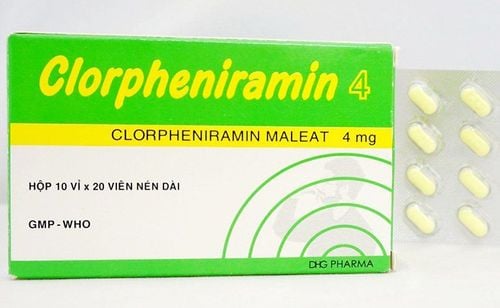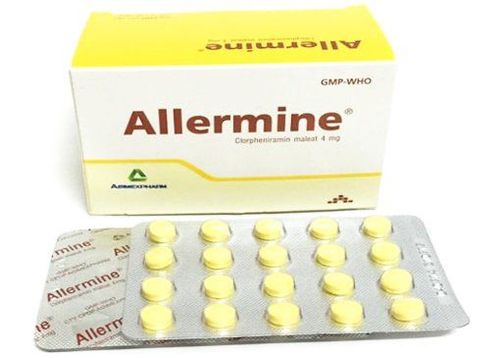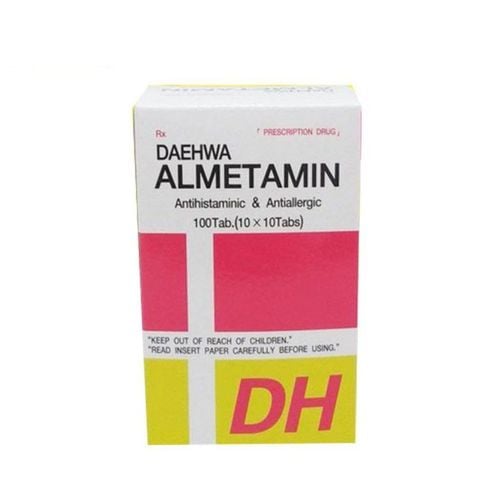Almetamin is a medication prescribed for treating allergic conditions, with the main active ingredients being Betamethasone and Dexchlorpheniramine. To ensure effective treatment and avoid side effects, patients must follow the doctor's or pharmacist's instructions.
1. What is Almetamin 2mg?
Almetamin is a product of Korea United Pharm INT'L, containing 2 mg of Dexchlorpheniramine maleate and 0.25 mg of Betamethasone. It is prescribed for: Urticaria (hives), Seasonal allergic rhinitis, Chronic bronchial asthma, Drug hypersensitivity, Contact dermatitis, Allergic conjunctivitis,…
2. Ingredients of Almetamin 2mg
Almetamin contains two main ingredients:
- Betamethasone: 0.25mg
- Dexchlorpheniramine: 2mg
3. Uses of Almetamin 2mg
Indication
- Almetamin is indicated in the following cases:
- Urticaria
- Allergic dermatitis, contact dermatitis, eczema
- Chronic bronchial asthma
- Seasonal and perennial allergic rhinitis
- Allergic conjunctivitis
Pharmacodynamics
Almetamin combines the anti-allergic and anti-inflammatory effects of corticosteroid betamethasone, a derivative of prednisolone, and the antihistamine effects of dexchlorpheniramine maleate. The combination of betamethasone and dexchlorpheniramine maleate allows for a reduced corticosteroid dose while achieving similar efficacy to using a higher dose of corticosteroid alone.
Pharmacokinetics
- Dexchlorpheniramine maleate: Dexchlorpheniramine maleate is absorbed relatively slowly after administration. Its plasma concentration peaks between 2.5 to 6 hours. The drug's bioavailability is low, with reported values ranging from 25% to 50%. Approximately 75% of dexchlorpheniramine in circulation is bound to plasma proteins. Dexchlorpheniramine maleate is distributed throughout the body, including the central nervous system. It is excreted in the urine as unchanged drug and metabolites, with only trace amounts found in feces. Some studies have shown that absorption in children is higher and faster. The clearance rate in children is faster, and the half-life is shorter compared to adults.
- Betamethasone: Betamethasone is well absorbed when taken orally. After absorption, approximately 90% or more of the betamethasone in plasma is bound to proteins. Excretion: Through urine as metabolites.
4. Dosage of Almetamin 2mg
How to Use:
Almetamin 0.25mg is taken orally.
Dosage:
- For adults and children over 15 years: Initial dose is 1-2 tablets, 3-4 times a day.
- For children aged 8-14 years: Initial dose is 1/2-1 tablet, 3-4 times a day.
- For children aged 3-7 years: Initial dose is 1/4 tablet, 2-3 times a day.
When symptoms improve, the dose can be gradually reduced to the minimum maintenance dose and then discontinued. Dosage may be increased as directed by a physician.
Note: The above dosage is for reference only. The specific dosage will depend on the condition and severity of the disease. Consult your doctor or healthcare professional for the appropriate dosage.
What to Do in Case of Overdose?
Some overdose reactions with common antihistamines (sedative effects) can range from central nervous system depression (sedation, respiratory arrest, decreased alertness, cardiovascular collapse) to stimulation (insomnia, hallucinations, tremors, seizures) and even death.
Other signs and symptoms include: ataxia, double vision, hypotension, dizziness, tinnitus.
5. Side Effects of Almetamin 2mg
When using Daehwa Almetamin, you may experience some adverse drug reactions (ADRs).
- Urinary System: Polyuria, difficulty urinating.
- Cardiovascular System: Hypertension.
- Hematologic: Thrombocytosis, leukocytosis.
- Skin: Eczema, acne, hyperpigmentation, hirsutism, hair loss, itching, sweating disorders, subcutaneous hemorrhage, petechiae.
- Hypersensitivity Reactions: Rash.
- Psychiatric: Mental disorders, restlessness, agitation, insomnia, drowsiness, headache, feeling of suffocation.
- Gastrointestinal: Gastric ulcer, heartburn, stomach pain, nausea, vomiting, increased thirst, increased appetite, diarrhea.
- Endocrine: Menstrual disorders, acute adrenal insufficiency, diabetes, growth inhibition in children.
- Musculoskeletal: Osteoporosis, steroid myopathy, muscle pain, joint pain.
- Ophthalmologic: Subcapsular cataracts, glaucoma.
- Other Side Effects: Infections, discomfort, moon face, fever, weight gain.
If you experience any side effects, the first thing to do is stop using the medication. Then, inform your doctor or visit the nearest medical facility for timely treatment.
6. Precautions When Using Almetamin 2mg
Contraindications
Almetamin is contraindicated in the following cases:
- Patients with eye diseases, such as increased intraocular pressure.
- Patients with prostate hypertrophy.
- Patients who have recently received smallpox vaccination. This is because vaccination in patients using steroid hormones can lead to mental disorders and antigen-antibody reactions may not occur.
Caution When Using
Users should not abruptly stop the medication, as symptoms such as fever, headache, loss of appetite, fatigue, muscle pain, joint pain, and shock syndrome may occur. Therefore, users should gradually reduce the dose.
Use Almetamin 2mg with caution in the following patient groups: Patients with tuberculosis, peptic ulcer, mental disorders, herpes simplex keratitis, hypertension, thrombocytosis, subcapsular cataracts, diabetes, osteoporosis, and infectious diseases.
Pregnancy
In animals, studies have shown teratogenic effects when using Almetamin tablets. Newborns of mothers who used adrenal hormones during pregnancy may have adrenal insufficiency. The safety of the medication during pregnancy has not been confirmed. Therefore, Almetamin tablets should not be used by pregnant women unless prescribed by a doctor.
Breastfeeding
Betamethasone is excreted in breast milk and may harm the infant. The medication can inhibit growth and cause other unwanted effects, such as reduced adrenal function. When using this medication, the benefits for the mother must be weighed against the potential risks to the infant.
Dexchlorpheniramine is excreted in breast milk, and the side effects of antihistamines have been described as having a higher risk in newborns and premature infants. The manufacturer advises that due to the potential for serious adverse reactions in nursing infants, a decision should be made to either discontinue breastfeeding or discontinue the medication. Additionally, the importance of the medication to the mother should be considered.
7. Drug Interactions
Using this medication with the following drugs may increase the effects of both: Central nervous system depressants, MAO inhibitors, and alcoholic beverages.
Almetamin is prescribed for treating allergic conditions with the main active ingredients being Betamethasone and Dexchlorpheniramine. To ensure effective treatment and avoid side effects, patients must follow the doctor's or pharmacist's instructions.
To arrange an appointment, please call … or make your reservation directly HERE. You may also download the MyVinmec app to schedule appointments faster and manage your reservations more conveniently.













